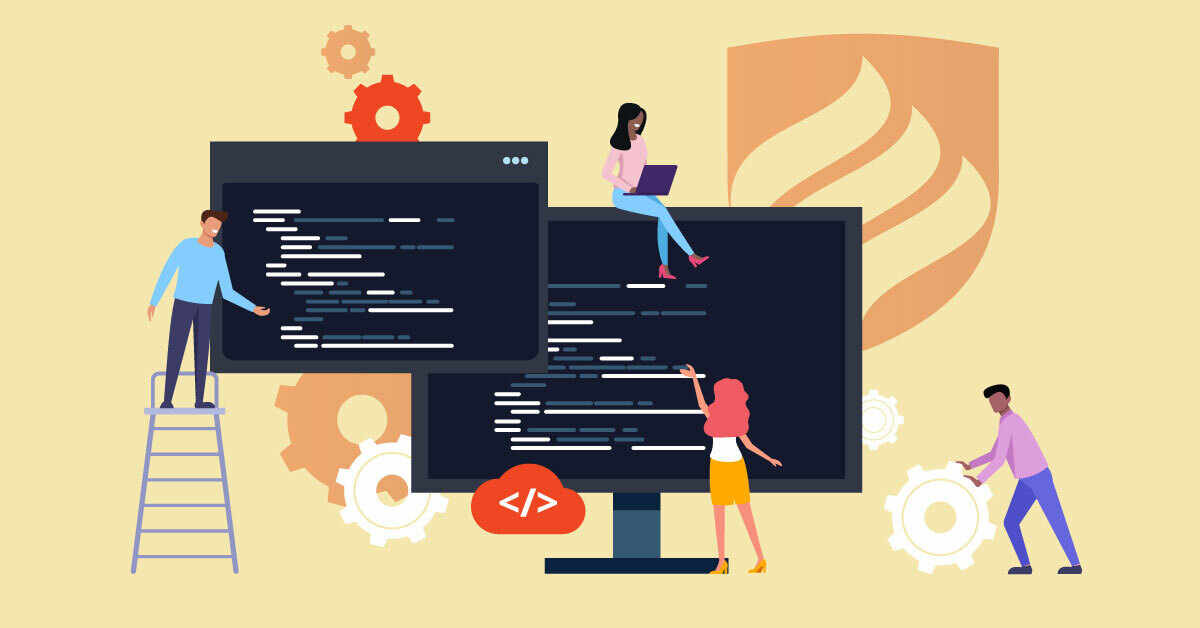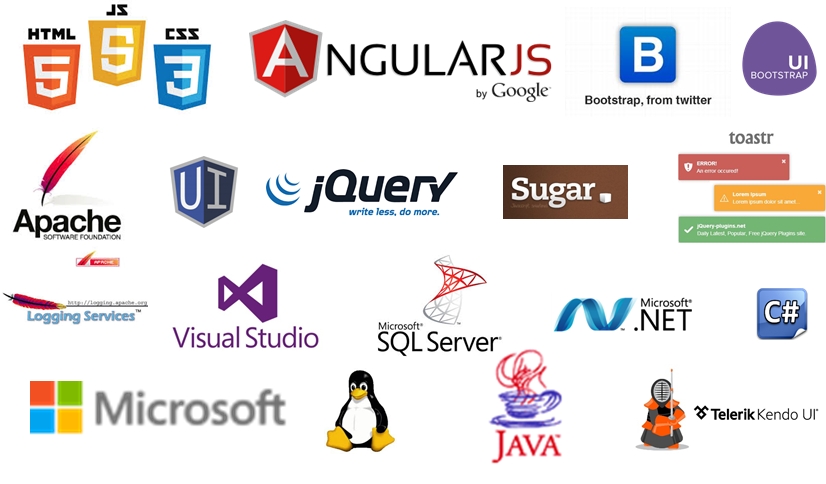In the world of tech, there are a handful of roles and titles that can be confusing to navigate. Two important roles that can be confusing are full stack developer and software engineer. While there is some overlap between the two, there are also differences in their responsibilities and skill sets, range of knowledge, and more. This guide will help you understand the key similarities and differences between these two professions.

Photo by Mimi Thian on Unsplash
Contents
- What is a Full Stack Developer?
- What is a Software Engineer?
- What are the Key Differences and Similarities Between the Two Roles?
- Which is Right For Me?
What is a Full Stack Developer?
A full stack developer understands and works with the entire software development process, from start to finish. They work in both frontend and backend development, which enables the expertise in the entire process. Full stack developers are skilled in a variety of coding languages and frameworks, and they are involved in all aspects – from consultation and brainstorming to deploying a project for official use. Their broad skill set can involve them in important parts of the development lifecycle such as design, database management, and server maintenance. This makes them a valuable asset to workplaces looking to streamline their development process and quickly bring new projects to market.
Frontend Development
Frontend development refers to the creation of user interfaces and the visual, aesthetic aspects of an application. In other words, this encompasses everything you can interact with on a webpage or app. Frontend developers are well-versed in programming languages such as HTML, CSS, and JavaScript. They can design user interfaces that are aesthetically pleasing, responsive, and intuitive to use.
Backend Development
On the other hand, backend development involves the server-side programming and infrastructure that powers an application. This is where a project’s functionality is regulated and information is stored. Backend developers usually work with languages such as Python, Java, or Ruby, along with frameworks like Node.js, Django, or Ruby on Rails. They can develop unique requests that can power things like search bars, handle databases, and manage server configurations.

Source: One Month
What is a Software Engineer?
A software engineer focuses on designing, developing, and testing software systems. Unlike full stack developers, software engineers often only work on a specific aspect of the software development life cycle. They create software while considering scientific concepts and the guidelines set by the client or project, and execute while analysing user needs. They are more likely to collaborate with cross-functional teams, including product managers, designers, and quality assurance engineers, to ensure that the software meets the desired functionality and performance standards.
Specialties
The term “software engineer” is broad and can cover a range of specialties. Software engineers can specialise in parts of development such as database management, software architecture, web development, mobile development, and more. One thing that’s for sure is that they usually build reliable software solutions that meet specific requirements. They are more likely to work in backend development, so they may use programming languages like C# and Java.
Common Tasks
Outside of the specialisations in software development, engineers often take on related tasks. Some of these include writing technology documentation, conducting code reviews, implementing testing strategies, and optimising software performance. They have a strong understanding of software development methodologies, such as Agile or Scrum, which enable them to adhere to industry best practices to deliver high-quality software solutions.

Source: Elmhurst University
What are the key differences and similarities between the two roles?
Both of these roles are essential to software development, and they share many similarities. They also have differences that manifest through the skill sets and technologies used in each role, as well as the career outlook and knowledge range.
Skill Set
Full stack developers and software engineers both require strong technical skills, including proficiency in programming languages, databases, and software development tools. However, full stack developers typically need a broader range of skills, including knowledge of front-end and back-end development languages. Software engineers usually specialise in specific languages or technologies, and may also need expertise in software design and architecture. However, both roles require strong problem-solving and communication skills, as well as the ability to work collaboratively with other developers and stakeholders.
Tools and Technologies
Full stack developers and software engineers use a variety of tools and technologies to build software applications. While software engineers typically focus on backend coding languages and frameworks, full stack developers also need to be familiar with frontend development tools like React, Vue, and Angular. In addition, software engineers may require expertise in software design patterns and architecture, while full stack developers may not have as much of an expertise in such areas. Regardless, both roles require familiarity with version control systems like Git and project management tools like JIRA, which can be essential in software development.

Source: Zenatek
Careers
Both full stack developers and software engineers are in high demand in the tech industry. Employment of software developers as a whole is projected to grow 22% from 2019 to 2029, much faster than the average for many other occupations. When it comes to the types of projects they work on, a full stack developer might create a web application from scratch, while a software engineer might focus on improving the functions of an existing software program.
The demand for full stack developers is on the rise, as companies want developers who can handle both frontend and backend tasks. They are able to oversee a project from start to finish and can also assist other developers with their tasks. Full stack developers are often in high demand among startups, as they can provide technical support and handle all aspects of application development. Additionally, their diverse skill set makes them well-suited for entrepreneurship. Examples of web apps created by full-stack developers include Amazon and Grammarly.
Software engineers are sought out for their specialty. Unlike full stack developers, software engineers focus more on building native apps that are installed on a device and serve a singular purpose. As software engineers naturally have a higher level of expertise in specific areas, this makes them a great fit for teams that have a specific need or tech companies that specialise in software production. For example, companies in the financial, health, or hospitality industries need large software bases to manage customer information, and this is a task well-suited for someone focused on building efficient, scalable software.
Breadth vs. Depth
The breadth & depth of their work indicates another key difference between a full stack developer & a software engineer. Since a full stack developer has a broad range of skills and can work on any aspect of a web application, they end up being proficient in a large breadth of concepts and technologies. They are also able to assist their team members with any issues that arise, and are more likely to work more independently. On the other hand, a software engineer aligns more with depth – due to their knowledge in scientific practices and technologies that are used in specific parts of software development. This also means that software engineers may have limited accessibility to other parts of a project, but they still work closely with other team members to ensure the success of the project.

Source: Stack Overflow
Which is Right For Me?
When it comes to choosing between full stack development and software engineering, it ultimately depends on aspects like your professional goals, learning preferences, working style, and your preferred role on a team. Consider your strengths and interests, as well as the job market in your area, when deciding which path to pursue.
Professional Goals
If you enjoy working on websites and web applications, becoming a full stack developer may be the right choice for you. This role can give joy to the daring designers, logic lovers, and everyone in between.
However, if you prefer building complex programs using a smaller range of tools and technologies, then pursuing a career as a software engineer may be more fulfilling. This can be good for those who prefer to focus on challenging themselves in specific practices and technologies.
Continuous Learning
One of the most important aspects of a software developer’s job is that they never stop learning. There are constantly new technologies surfacing and being integrated to practices, which make it essential for both full stack developers & software engineers to continue learning.
If you’d love that challenge in a range of technologies, then a full stack development role might be perfect for you.
On the contrary, if you’re extremely interested in one area and are happy to keep growing there, then you are likely to thrive in a software engineer role.
Working Style
A software engineer typically focuses on completing a single project, while a full stack developer is more focused on maintaining and improving multiple projects and sometimes even live services.
If you’re more comfortable focusing on completing one project without having to pivot, a software engineer role might be best for you.
Ultimately, it’s important to assess the processes and environments that enable you to do your best work, in order to choose the role that is more suitable for you.
Collaboration & Leadership
While there are senior positions available to both full stack developers & software engineers, it is more likely for full stack developers to naturally take on leadership in their positions. They often hold leadership positions and oversee the development process due to working on different aspects of the cycle.
Software engineers may work under the guidance of others to build specific project features. If you’re passionate about mentorship and guidance, you might be able to find this more easily as a full stack developer, but both roles often involve working as part of a team. However, this is by no means the only option, as many professionals in these fields also work as freelancers and contractors.

Source: MOOC
Both careers offer high salaries and exciting opportunities, as there is a strong demand for professionals in both fields. Gaining knowledge in both has also become very accessible with the rise in popularity of tech bootcamps. Even better – most bootcamps, like our very own Full Stack Development bootcamp, are suitable for those coming into the fields with no prior knowledge. It offers extensive training, hands-on projects, and job search assistance.
Conclusion
A full stack developer is responsible for both the front-end and back-end development of a website or application, while a software engineer may focus more on the overall design and functionality of the software. While there is some overlap between the full stack developer & software engineer roles, there are also some key differences that set them apart. Understanding these differences can help you determine which role might be the best fit for your skills and interests. One thing they do have in common is the promising career prospects and continuous learning. Whether a team goes with a full stack developer or software engineer depends on the project and team size, but both are essential for creating successful software products and to continue innovation around the world.
FAQs
1. Which is better: Full Stack Developer or Software Engineer?
Both roles are an asset to many technical teams, so one being more suited will depend on what is better for you. If you prefer different types of projects, a full stack developer role might be better for you. If you intend to specialise in one area of development, a software engineer role would allow you to do this.
2. What language is best for a Full Stack Developer?
JavaScript is great for full stack developers, as it can be used on both the frontend and backend. Python and Java are popular backend languages, while HTML and CSS are essential for the word processing and styling of full stack apps.
3. Is becoming a Full Stack Developer harder than a Software Engineer?
Both jobs require different skill sets to be able to excel. One thing that is common is the technical skills, programming languages, and frameworks that will be used. However, full stack developers often have to learn project management skills in addition to their technical skills.



